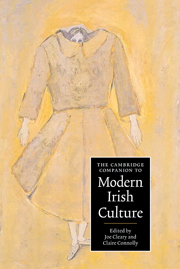Book contents
- Frontmatter
- 1 Introduction: Ireland and modernity
- Part I Cultural politics
- Part II Cultural practices and cultural forms
- 9 Modernism and the Irish revival
- 10 Poetry in Ireland
- 11 Irish sport
- 12 Projecting the nation: cinema and culture
- 13 Folk culture
- 14 Irish prose fiction
- 15 Irish music
- 16 Modern architecture and national identity in Ireland
- 17 The visual arts in Ireland
- 18 Irish theatre
- Index
10 - Poetry in Ireland
from Part II - Cultural practices and cultural forms
Published online by Cambridge University Press: 28 May 2006
- Frontmatter
- 1 Introduction: Ireland and modernity
- Part I Cultural politics
- Part II Cultural practices and cultural forms
- 9 Modernism and the Irish revival
- 10 Poetry in Ireland
- 11 Irish sport
- 12 Projecting the nation: cinema and culture
- 13 Folk culture
- 14 Irish prose fiction
- 15 Irish music
- 16 Modern architecture and national identity in Ireland
- 17 The visual arts in Ireland
- 18 Irish theatre
- Index
Summary
To give an account of poetry in modern Ireland is not an entirely straightforward matter, for several reasons. To begin with the most obvious, using the title 'Poetry in Ireland' rather than 'Irish Poetry' sidesteps a vital issue. Since the Middle Ages, poetry has been written on the island in both Irish and English. Recently there has been some dispute over whether the poetry in the two languages can sensibly be seen as a single entity at all, as 'Irish Poetry'. The classic claim in favour of such a shared poetic tradition was made by Thomas Kinsella, both in his book The Dual Tradition, and in the introduction to his New Oxford Book of Irish Verse in 1986:
It should be clear at least that the Irish tradition is a matter of two linguistic entities in dynamic interaction, of two major bodies of poetry asking to be understood together as functions of a shared and painful history . . . To limit a response to one aspect only, as is often done – to the literature in Irish, through specialized academic concerns or out of nationalist emotion, or to the literature in English as an annexe to British literature . . . is to miss a rare opportunity: that of responding to a notable and venerable literary tradition, the oldest vernacular literature in Western Europe, as it survives a change of vernacular.
- Type
- Chapter
- Information
- The Cambridge Companion to Modern Irish Culture , pp. 173 - 189Publisher: Cambridge University PressPrint publication year: 2005



